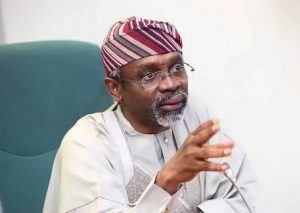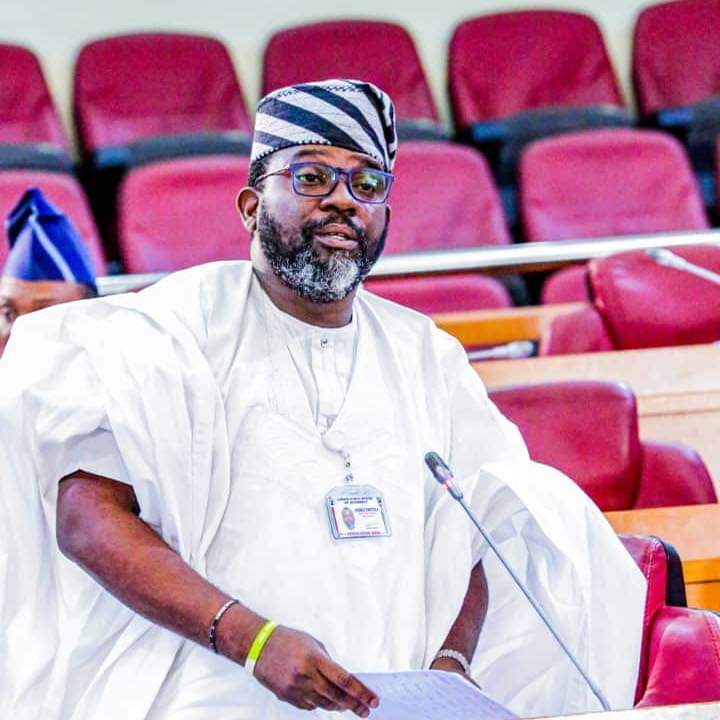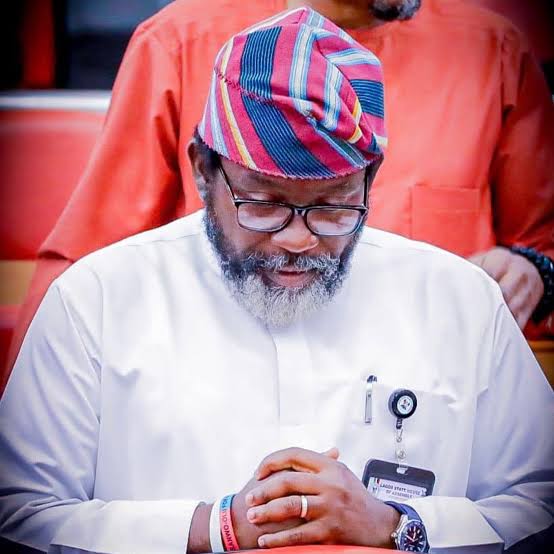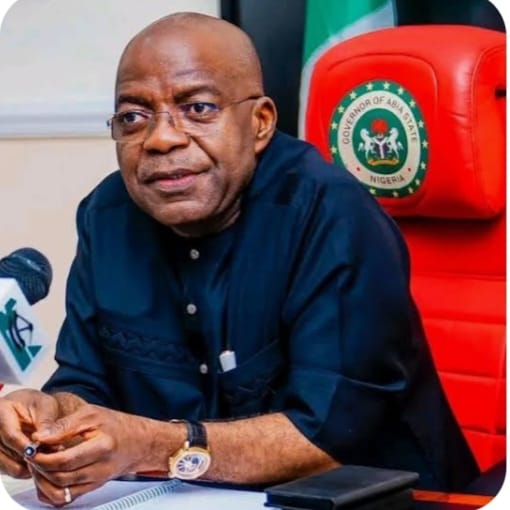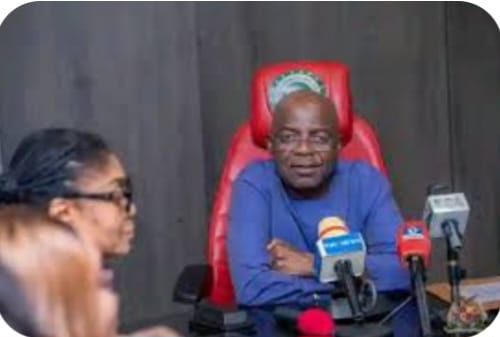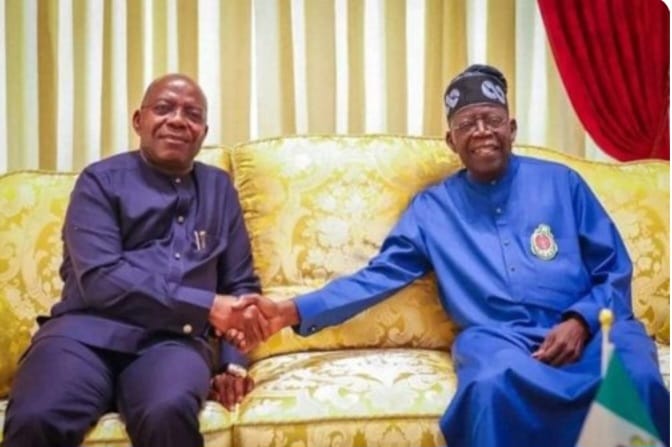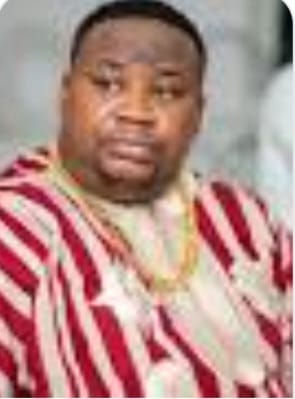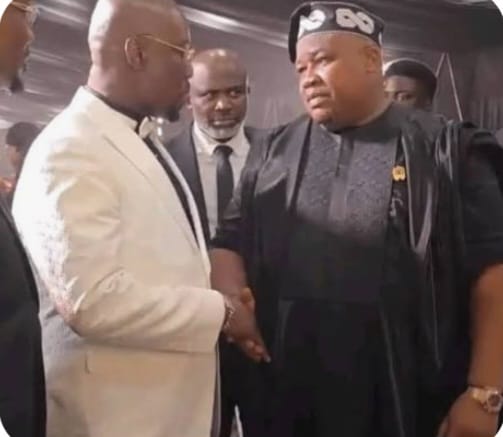Politics
Celebrating Gbajabiamila’s Twin Babies In NASS* By Philip Agbese
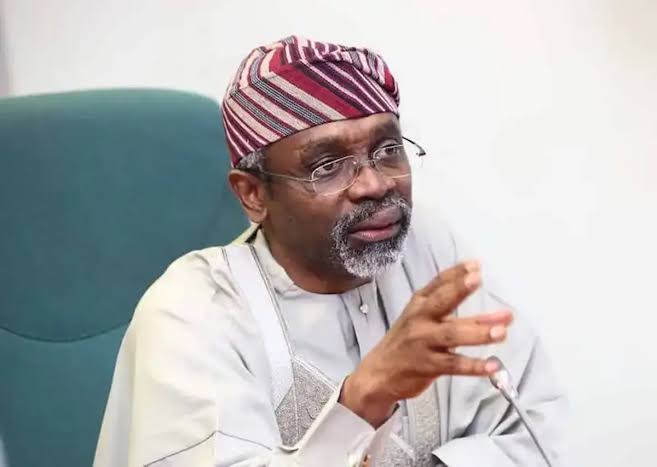
Celebrating Gbajabiamila’s Twin Babies In NASS
By Philip Agbese
As the dust settles on the newly renovated main Chambers of the National Assembly, a sense of pride and accomplishment fills the air. As I sit down to write this piece, I can’t help but marvel at the transformation that has taken place within the hallowed halls of the National Assembly, all thanks to the indomitable spirit and vision of Rt. Hon. Femi Gbajabiamila. The recent renovation of the main Chambers of the National Assembly, which now houses the Representatives and the Senate, is nothing short of a dream come true. The newly established National Assembly Library and Research Centre stands as evidence of the unwavering dedication of Femi Gbajabiamila, the current Chief of Staff to the President.
The Book of History was filled again with overwhelming salient paragraphs when the Chief of Staff to the President and immediate past, Speaker, House of Representatives, Rt. Hon Femi Gbajabiamila, CFR visits the new National Assembly Library/Resource Centre and the Newly renovated House of Representatives Chambers, projects facilitated in the 9th Assembly under Gbajabiamila’s leadership. There, he was received by the Speaker of the House of Representatives, Rt. Hon. Abbas Tajudeen, Ph.D., principal officers, and other members of the House of Representatives at the National Assembly on Monday.
In a manner reminiscent of a woman in the labour room discovering she’s been carrying twins, the unveiling of these projects has brought an unexpected and delightful surprise to the forefront. The parallel between the birth of new life and the rebirth of the National Assembly is both humorous and enlightening, underscoring the unforeseen potential that lay dormant, waiting to be realized.
What sets these achievements apart is not just their aesthetic appeal but the fact that they were executed and delivered by indigenous contractors. The successful completion of these projects and the inspection of both facilities on Monday has confirmed what many of us have long believed – that we are more than capable of achieving greatness without relying on foreign companies who often seek to exploit us for their gain.
The inspection of these facilities has not only confirmed their quality but has also served as a resounding rebuttal to the notion that foreign companies are the only ones capable of delivering large-scale projects. This display of homegrown excellence stands as a testament to the ingenuity and proficiency of Nigerian contractors, dispelling the myth that foreign entities hold a monopoly on quality construction.
Drawing parallels to the biblical story of Solomon completing the temple started by David, the current Speaker of the House of Representatives, Rt. Hon. Abbas Tajudeen, Ph.D., exemplifies humility and dedication, which I found admiring and worthy of note. Just as Solomon saw to the completion of his predecessor’s grand vision, Speaker Tajudeen has carried forward Gbajabiamila’s initiatives with grace and commitment. Hon. Abbas is not given to self-aggrandizement, but the one I know to be filled with total humility and respect. His leadership and collaborative approach have been instrumental in ensuring the successful realization of these projects, thereby further reflecting Nigeria’s commitment to democratic governance.
The significance of these developments extends beyond the physical structures themselves. The renovated chambers and the establishment of the research center not only elevate the image of the parliament, but also reflects the grandeur of renowned parliaments, positioning the National Assembly as a hub for legislative research and innovation, not only within Nigeria but across the African continent. This development opens doors for collaboration and knowledge sharing among lawmakers, fostering a more informed and progressive legislative environment. The impact of these facilities will undoubtedly reverberate far beyond the walls of the National Assembly, leaving an indelible mark on the legislative landscape.
Reflecting on my visit to the British Parliament in 2018, I am struck by the uncanny resemblance between those esteemed halls and the newly refurbished chambers here in Abuja. This is a testament to the remarkable work of Gbajabiamila, and I am honoured to witness such a significant milestone during my tenure as a member of the House.
Now let’s picture this – the National Assembly undergoing a makeover, complete with a stylish new library and research centre. It’s as if the hallowed halls received a fabulous makeover, courtesy of none other than Gbajabiamila. The thought of stately politicians surrounded by the trappings of modernity is enough to bring a smile to anyone’s face.
In the spirit of education and enlightenment, it’s crucial to highlight the transformative power of these developments for a clearer understanding. The establishment of a state-of-the-art research centre within our National Assembly is a cause for celebration, as it signifies our commitment to intellectual growth and legislative prowess. With these new facilities, the possibilities for groundbreaking research, innovative legislation, and collaborative efforts are simply boundless.
Special credit must also be given to Hon. Dan Amos, the current House Committee Chairman on House Services, for his outstanding supervision throughout the renovation and establishment processes. His meticulous oversight also ensured that these projects were executed seamlessly, delivering a result that meets the highest standards. Hon. Amos and his committee can be likened to the midwives who facilitated the successful delivery of Gbajabiamila’s vision for the National Assembly. Their dedication and attention to detail deserve good recognition.
As I sit privileged to serve as a member of the House, the transformation of the National Assembly under the leadership of Gbajabiamila has not only inspired a sense of pride but has also evoked a sense of humour and awe at the unexpected and delightful turn of events. The collaborative efforts and dedication of all those involved in making this dream a reality is much overwhelming and it’s a testament to the existing unity in Nigeria as a whole, irrespective of party affiliations or political loyalty. The juxtaposition of the unexpected twin babies and the unveiling of these projects serves as a profound testament to the fulfilment of a grand vision.
Truly for a fact, this recent unveiling of the refurbished chambers, alongside the inauguration of the National Assembly Library and Research Centre, marks a significant milestone in transforming Nigeria’s legislative hub. The brain behind this remarkable feat, Rt. Hon. Femi Gbajabiamila has not only delivered on his vision but has also set a new standard for indigenous excellence in infrastructure development.
In conclusion, the transformation of the National Assembly under the stewardship of Femi Gbajabiamila is not only a testament to his vision and leadership but a resounding declaration of the capabilities and potential of indigenous talent. Gbaja’s unwavering dedication to the betterment of the National Assembly has brought about a renaissance that will leave an indelible mark on the fabric of our legislative institution. The humour, the unexpectedness, and the educational significance of these developments all coalesce to paint a picture of a man who has redefined the landscape of the National Assembly and has emerged as the perfect embodiment of fulfillment.
As we bask in the glory of these achievements, let us not forget the humour and joy that accompanies such momentous occasions. After all, laughter and lightheartedness can make even the most serious of endeavours all the more enjoyable. With great delight and pride, I celebrate the birth of Gbajabiamila’s “twin babies” in the National Assembly, a testament to his vision, leadership, and the potential of indigenous excellence. Cheers to Gbajabiamila and the vibrant future of the National Assembly!
Agbese MHR is the Deputy Spokesperson, National Assembly’s House of Representatives, writing from Abuja.
Politics
Why Ifako-Ijaiye’s Voice Is Louder At The Lagos Assembly: The Jah Factor
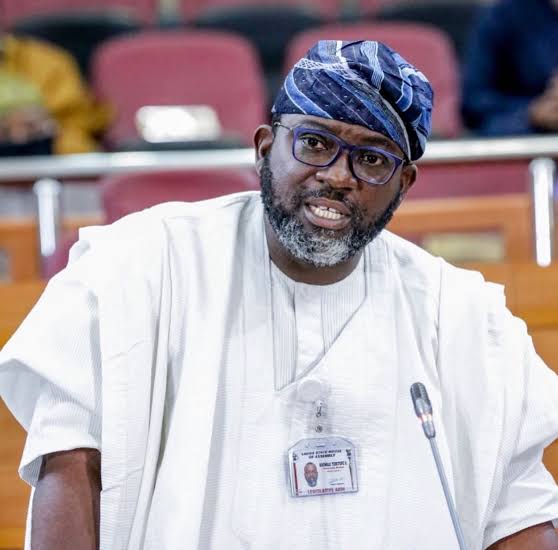
Why Ifako-Ijaiye’s Voice Is Louder At The Lagos Assembly: The Jah Factor
By Ibukun Simon
In legislative politics, not all representatives are created equal. Some merely occupy seats; others shape conversations, influence outcomes, and leave visible footprints in the lives of their people. Since 2019, Ifako-Ijaiye Constituency I has belonged firmly to the latter category, thanks to the emergence of Hon. Adewale Temitope Adedeji, fondly known as JAH, as its representative in the Lagos State House of Assembly.
As a journalist who has covered proceedings of the Lagos Assembly consistently since 2015, I have witnessed first-hand how representation can either fade into the normal routine or rise into relevance. The entry of Hon. Adedeji into the Assembly marked a clear turning point—not only for Ifako-Ijaiye, but for the quality of debate, advocacy, and people-focused legislation within the House.
On the floor of the Assembly, Hon. Adedeji stands out as one of the lawmakers journalists naturally gravitate towards. His interventions during plenary sessions are deliberate, articulate, and deeply rooted in public interest and knowledge. In the 40-member House, he is widely regarded as one of the top five lawmakers whose contributions command attention, not because of theatrics, but due to his clarity of thought, persuasive delivery, and uncommon mastery of issues. When JAH speaks, the chamber listens—and the press takes notes.
This strength of presence is crucial in a legislative environment where influence matters. In parliamentary practice, experience translates to authority. The Lagos State House of Assembly, like many legislatures, places significant weight on ranking members—lawmakers whose sustained service enhances their ability to push motions, influence committee outcomes, and attract development to their constituencies. Returning Hon. Adedeji to the House in 2027 would therefore mean strengthening Ifako-Ijaiye’s bargaining power and ensuring its concerns are not just heard, but prioritized.
Beyond the chambers, the impact of Hon. Adedeji’s representation is visible across the constituency. In terms of infrastructural development, several road construction and rehabilitation projects have been attracted to Ifako-Ijaiye under his watch, improving accessibility, boosting local businesses, and easing daily movement for residents. These are practical dividends of democracy that speak louder than campaign slogans.
Equally significant is his focus on human development and social inclusion. Since assuming office in 2019, Hon. Adedeji has facilitated job opportunities, empowered the less privileged, and consistently supported students through the distribution of JAMB and GCE forms, helping to remove financial barriers to education. These interventions reflect the impact of a representative who understands that development must touch both infrastructure and people.
What further distinguishes Hon. Adedeji is his constant engagement with constituents. Through consultations, town-hall interactions, and accessibility, he has maintained a relationship that goes beyond election cycles. This closeness has fostered trust and ensured that governance remains responsive to grassroots realities.
As Lagos continues to grow and legislative responsibilities become more demanding, constituencies like Ifako-Ijaiye cannot afford experimental representation. They require lawmakers who understand the system, command respect within it, and can translate legislative influence into real benefits for the people.
From the Assembly floor to the streets of Ifako-Ijaiye, the record since 2019 is clear: effective representation works—and Hon. Adewale Temitope Adedeji has delivered it.
Ibukun writes from Ifako-Ijaiye.
Politics
Lack of Understanding or Legitimate Concern? Otti’s Defence of Tinubu’s Tax Reform Sparks National Debate
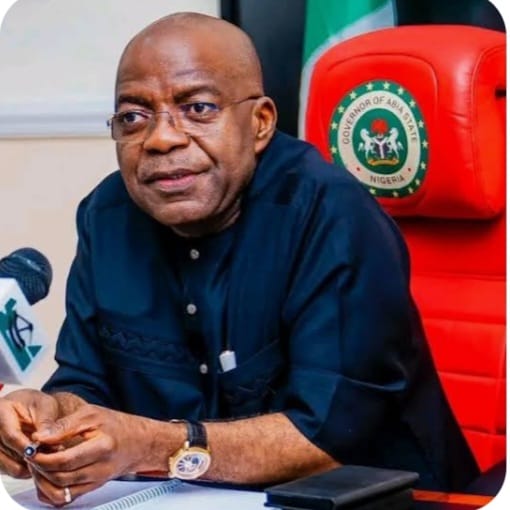
Lack of Understanding or Legitimate Concern? Otti’s Defence of Tinubu’s Tax Reform Sparks National Debate
By George Omagbemi Sylvester | SaharaWeeklyNG
“Abia Governor Alex Otti argues critics misunderstand the overhaul of Nigeria’s tax laws, but the controversy reveals deeper anxieties about governance, transparency and economic strain.”
When Abia State Governor Alex Otti publicly defended President Bola Ahmed Tinubu’s newly enacted tax reform laws on February 13, 2026, he did more than just push back at critics, he threw the spotlight back on a fulcrum issue dividing Nigeria’s political and economic classes. Otti’s assertion that Nigerians attacking the tax policy “lack understanding” crystallises a broader fracture in public discourse over fiscal policy, governance and the future of the Nigerian economy.
The comments from Governor Otti came amid an intensifying national conversation over sweeping tax reforms signed into law in June 2025, designed to modernise Nigeria’s tax architecture and expand revenue mobilisation. These reforms (long in the making and championed by a Presidential Fiscal Policy and Tax Reforms Committee chaired by Prof. Taiwo Oyedele) mark the most far‑reaching overhaul of federal tax laws in decades. They include restructuring the Federal Inland Revenue Service into the National Revenue Service (NRS), establishing a Tax Appeal Tribunal and Ombudsman Office, and unifying revenue collection frameworks to improve transparency and efficiency.
Governor Otti’s praise for the new legislation resonated with elements of his own fiscal thinking. Drawing on economic positions he articulated nearly a decade ago, he argued that key principles now entrenched in the law reflect sound fiscal reasoning and long‑standing proposals to strengthen Nigeria’s economic foundations. “Almost 10 years ago, I wrote about the fiscal side of things,” Otti said. “When I read the new tax reform law, I saw many of those arguments reflected in it. I thank Prof. Oyedele. When people attack him, they don’t understand.”
Yet, while Otti’s intervention was meant to de‑escalate public criticism, it instead exposed how complex and emotionally charged the issue of taxation has become in Nigeria. Critics, both inside and outside government, argue that the reforms have not been adequately explained to citizens and that many fear the measures will aggravate hardship amid already high costs of living. One prominent voice of dissent, fiscal policy analyst Aborisade, warned that without transparency and clear communication on how tax revenues will be collected and returned to the people, “these reforms risk becoming deeply unpopular.” Critics also highlight that any tax increase implemented without demonstrable improvements in public services could fuel resentment and mistrust in governance.
That mistrust is not abstract. For years, Nigeria has struggled with weak tax compliance, low revenue‑to‑GDP ratios compared with other emerging economies, and public scepticism over how government revenues are utilised. Many Nigerians remember episodes where policy changes were not accompanied by visible improvements in infrastructure, healthcare or power delivery, reinforcing the belief among skeptics that new taxes equate to greater burden with little reward.
For supporters like Otti and others in government policy circles, the reforms represent a long‑overdue attempt to widen the tax net and reduce Nigeria’s chronic dependence on volatile oil revenues. Advocates argue that a modernised tax system can enhance domestic revenue mobilisation, reduce fiscal deficits, and create a more resilient economy. They point out that reforms provide exemptions and reliefs for low‑income earners and small businesses and are aimed at building a fairer, more transparent system for all stakeholders.
Still, bridging the gap between these competing narratives is challenging. Opposition voices contend that even well‑designed tax policy may fail if the state lacks the capacity to implement it equitably or if the public’s confidence in leadership remains weak. “Without accountability and clear benefits for their contributions, any tax reform risks becoming deeply unpopular,” Aborisade emphasised, warning that heavy taxation without trust can fracture the social contract.
The debate over Tinubu’s tax reform illustrates a deeper truth about contemporary Nigeria: that economic policy no longer exists in a vacuum but is deeply intertwined with public sentiment, political legitimacy, and social cohesion. As one respected economist put it, “Taxation is not just a fiscal tool, it is a trust‑building exercise between the state and its citizens.” When that trust is fragile, even technically sound reforms can be seen as punitive rather than constructive.
Analysts suggest that meaningful public engagement (including sustained information campaigns, transparent revenue utilisation reporting and constructive dialogue with civil society) is essential to soothe anxieties and build confidence in the new system. Without this, what began as an effort to stabilise public finances could widen political and social divides.
In defending the tax reforms, Governor Otti has framed the challenge as one of comprehension rather than critique. But the controversy unfolding across Nigeria is not simply about misunderstanding; it underscores a profound gap between policy design and public perception. For a reform of this magnitude to succeed, Nigerians must be assured not only of its economic merits, but also of its fairness, transparency and tangible impact on everyday lives.
As the implementation phase continues through 2026 and beyond, the Tinubu administration, state governments and economic stakeholders face the critical task of translating legislative change into broader public trust – a task as difficult as any technical reform the tax laws themselves seek to achieve.
Politics
Cubana Chief Priest Backs Tinubu Ahead of 2027, Signalling Shift in Celebrity Political Alignments

Cubana Chief Priest Backs Tinubu Ahead of 2027, Signalling Shift in Celebrity Political Alignments
By George Omagbemi Sylvester | SaharaWeeklyNG
“Socialite’s public declaration underscores growing intersection of business, entertainment and electoral politics as Nigeria inches toward another high-stakes presidential race.”
A prominent Nigerian socialite and nightlife entrepreneur, Pascal Okechukwu (popularly known as Cubana Chief Priest) has publicly declared his support for President Bola Ahmed Tinubu ahead of the 2027 presidential election, in a move that has stirred debate across Nigeria’s political and social media landscapes.
The declaration emerged in early February 2026 through a series of Instagram posts and public exchanges with critics and followers. In those posts, the celebrity businessman stated unequivocally that he would align himself with Tinubu’s political camp and work against the anticipated presidential bid of former Anambra State governor and Labour Party figure, Peter Obi.
Cubana Chief Priest, who commands a large following across Nigeria’s entertainment and hospitality sectors, framed his decision as both a political and economic calculation. In one exchange, he argued that as an employer and businessman, he preferred collaboration with the incumbent administration rather than opposition politics.
He also publicly declared that he and his family had chosen to “stay with the moving train” of Tinubu’s “Renewed Hope” agenda, signalling clear political alignment with the ruling All Progressives Congress (APC).
The shift is politically significant because the socialite had previously been associated with Peter Obi during the 2023 presidential election cycle. In his own words, he acknowledged that he worked for Obi during that campaign, even while holding an advisory role to an APC-aligned state government.
His new stance therefore represents a notable reversal, particularly within the South-East business community, where Obi enjoyed strong support during the last election.
The controversy surrounding the declaration intensified after an online clash between Cubana Chief Priest and social commentator Isaac Fayose, the brother of former Ekiti State governor Ayodele Fayose. The dispute centred on the socialite’s decision to align with Tinubu’s political movement, with Fayose accusing him of opportunism. In response, Cubana Chief Priest defended his position, arguing that political alignment was a practical choice for a businessman responsible for large-scale employment.
He also linked his support for the APC government to broader political objectives, including the potential release of detained pro-Biafra leader Nnamdi Kanu, stating that such outcomes were more achievable from within the ruling political structure than from opposition ranks.
Beyond social media statements, reports indicate that Cubana Chief Priest has expressed interest in running for a seat in the House of Representatives in 2027 under the APC platform, suggesting that his endorsement of Tinubu is part of a deeper political ambition rather than a mere celebrity opinion.
News reports also describe his announcement of political plans and explicit backing of Tinubu as part of the emerging alignment of business figures with the president’s second-term project.
The development coincides with political moves by his associate, the businessman Obinna Iyiegbu, popularly known as Obi Cubana, who has also been linked to pro-Tinubu political structures ahead of 2027.
This clustering of influential entrepreneurs around the ruling party has prompted renewed discussion about the growing role of celebrity endorsements and business interests in Nigeria’s electoral politics.
Political analysts say such endorsements, while often symbolic, can influence public perception, especially among young voters who are heavily engaged with celebrity culture. As political scientist Larry Diamond once observed, “In transitional democracies, informal power networks (business elites, media figures, and celebrities) can shape political outcomes as much as formal party structures.”
Similarly, Nigerian scholar Professor Jibrin Ibrahim has argued that “the fusion of business capital and political capital is one of the defining features of contemporary Nigerian politics.”
However, critics warn that celebrity political alignments rarely translate into structured policy debates or ideological clarity. Economist Pat Utomi has repeatedly cautioned that “Nigeria’s democracy suffers when politics becomes an extension of celebrity influence rather than a contest of ideas and development strategies.”
For now, Cubana Chief Priest’s declaration remains a personal political endorsement rather than an official party appointment at the national level. Yet its timing (more than a year before the formal campaign cycle for 2027) illustrates how early positioning has already begun among Nigeria’s political and business elites.
Key figures involved:
Pascal Okechukwu (Cubana Chief Priest): Socialite and businessman who declared support for Tinubu.
President Bola Ahmed Tinubu: Incumbent Nigerian president expected to seek re-election in 2027.
Peter Obi: Former Anambra governor and likely opposition contender.
Isaac Fayose: Social commentator who criticised the endorsement.
Obinna Iyiegbu (Obi Cubana): Business associate linked to pro-Tinubu political structures.
As Nigeria moves gradually toward the 2027 electoral cycle, the intersection of celebrity influence, business interests and party politics is likely to intensify, raising fresh questions about the nature of democratic mobilisation in Africa’s most populous nation.
-

 celebrity radar - gossips6 months ago
celebrity radar - gossips6 months agoWhy Babangida’s Hilltop Home Became Nigeria’s Political “Mecca”
-

 society6 months ago
society6 months agoPower is a Loan, Not a Possession: The Sacred Duty of Planting People
-

 news6 months ago
news6 months agoTHE APPOINTMENT OF WASIU AYINDE BY THE FEDERAL GOVERNMENT AS AN AMBASSADOR SOUNDS EMBARRASSING
-

 Business6 months ago
Business6 months agoBatsumi Travel CEO Lisa Sebogodi Wins Prestigious Africa Travel 100 Women Award

